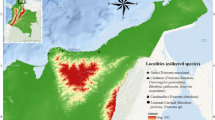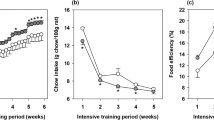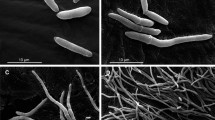Abstract
Two bush babies (Galago crassicaudatus lasiotis Peters), examined six weeks after capture, were found heavily infected with polymorphic trypanosomes. Inquiries elicited that a few weeks earlier they had escaped from their cages at night and eaten the bodies of several white rats killed while infected with a virulent strain of T. gambiense and left lying on a bench. As an experiment, another bush baby and a white rat heavily infected with T. rhodesiense were placed in the same cage. The rat was immediately seized, killed and eaten by the bush baby, which afterwards became infected. When tested the trypanosomes failed to penetrate mucous membranes, so were presumably transmitted through abrasions; the infections were fatal within a month.
This is a preview of subscription content, access via your institution
Access options
Similar content being viewed by others
References
zur Strassen, O., “Brehm's Tierleben”, Leipzig, 4th ed., 13 (1925).
Author information
Authors and Affiliations
Rights and permissions
About this article
Cite this article
HEISCH, R. Presence of Trypanosomes in Bush Babies after Eating Infected Rats. Nature 169, 118 (1952). https://doi.org/10.1038/169118a0
Issue date:
DOI: https://doi.org/10.1038/169118a0
This article is cited by
-
The clinico-pathology and mechanisms of trypanosomosis in captive and free-living wild animals: A review
Veterinary Research Communications (2009)
-
Oral transmission of trypanosomes of the subgenusHerpetosoma from small mammals
Parasitology Research (1995)



